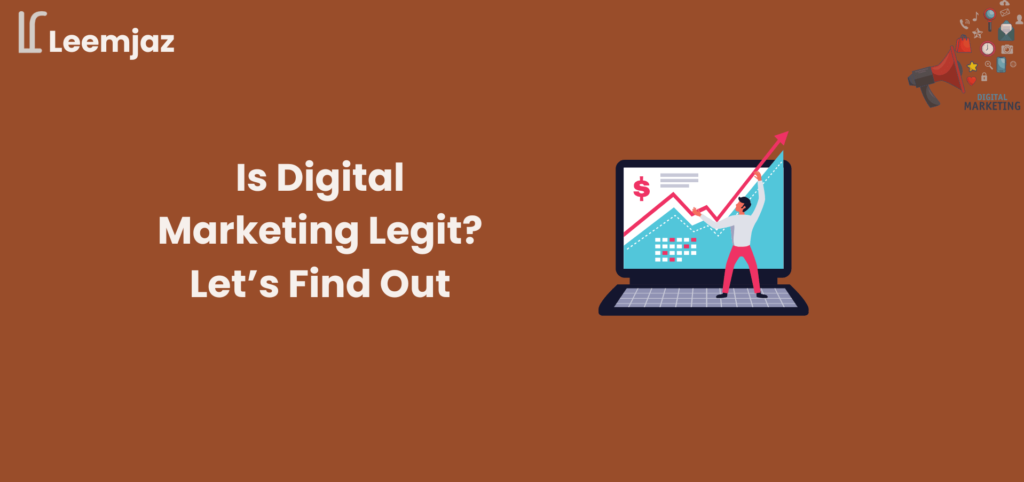More and more businesses are adopting digital marketing every single year. But one question still remains: is digital marketing legit? Is it a real tool for business development, or just yet another way to market trends that are getting way too much buzz?
If you are feeling skeptical, do not worry. Most companies are overwhelmed with information and don’t have a clue about where and how to spend their marketing budget. Don’t worry, we have to answer the question, Is Digital Marketing Legit? In this post, I will attempt to answer the question of whether digital marketing works, and at the same time, dispel some of the most common myths on the subject that are preventing you from leveraging this amazing tool.
What Is Digital Marketing: Let Us Explain
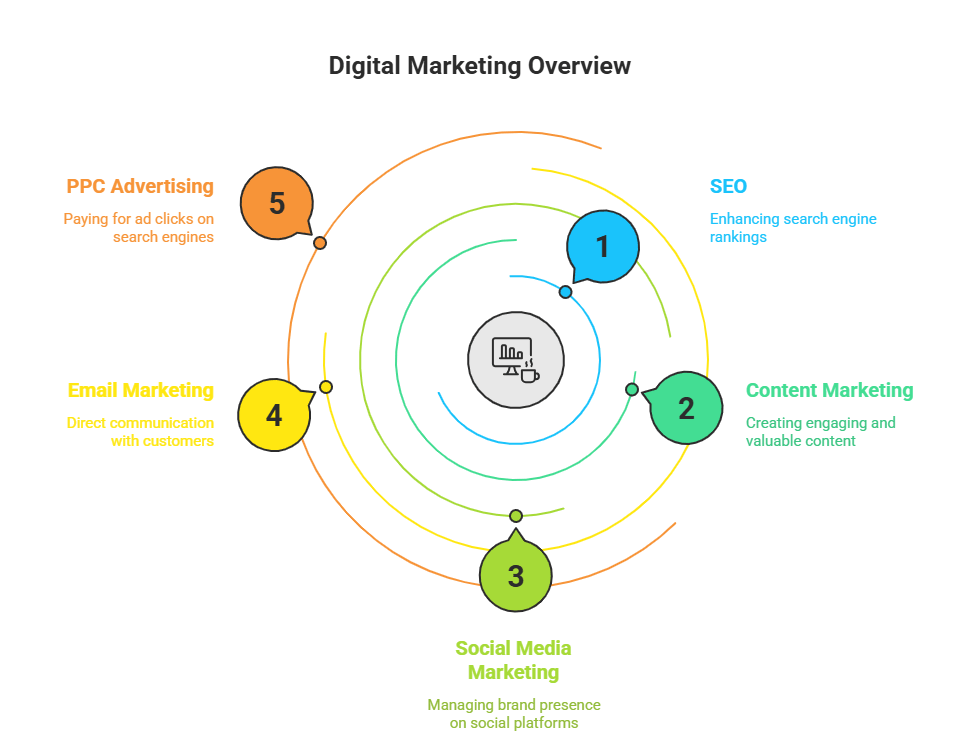
Before we move to answer the question if it is legit or not, let us first define what it is. Marketing refers to the process of creating, promoting, and selling goods or services. It includes all activities designed to move products from the manufacturer to the end user. These include advertising, public relations, and promotions. It is done through channels such as search engines, social media, and even websites.
It’s like instead of waiting for your customers to come to you, you go to them and have a conversation.
Key components of digital marketing are as follows:
Search Engine Optimization (SEO)
Elevating Your Business’s Google Ranking
SEO means improving the various factors that determine your websites ranking in search engines like Google. It involves optimizing the text, design, and HTML coding of your website so users looking for related topics or keywords can easily find it. Good SEO strategies boost traffic to a site and increases its discovery by potential customers. So, is digital marketing legit? SEO shows that it works as it boosts your brand awareness and visibility in searches.
What is Content Marketing?
Creating and distributing useful and relevant information to engage and educate the audience
Content marketing is about creating and distributing valuable information in any form such as articles, videos, blogs, infographics, or even eBooks in order to capture and retain audience attention. It also aims to support your audience’s educational, entertainment, and problem-solving needs while positioning your brand as an authority in the industry. Strong customer relationships and trust gained through effective content marketing proves digital marketing is legit when done right.
Social Media Marketing
Using Facebook, Instagram, and Twitter to gain brand visibility and recognition.
Social media marketing is the process of managing and promoting a brand on Facebook, Instagram, Twitter, LinkedIn, and others. It involves audience interaction, promotion, community development as well as managing scheduled paid advertisements. Social media marketing is known to enhance visibility and engagement with customers while cultivating brand loyalists. So, is digital marketing legit with regard to social media? Without a doubt, social media has proven to be one of the best ways to engage your audience.
Email Marketing
Writing bespoke emails to customers for the purpose of boosting engagement and conversions
Email marketing entails sending messages to predetermined groups of individuals. It is useful in nurturing relationships with customers by informing them about new items and driving sales. Email marketing campaigns require valuable content, segmentation, personalization, and prompt action for engagement from the recipients. Is digital marketing legit? Email marketing remains one of the oldest and most efficient means of keeping in touch with the audience.
PPC (Pay-Per-Click) Advertising
Paying for advertisement spaces that are shown when your business keywords are being searched for.
PPC advertising is a type of digital marketing where advertisers pay a fixed price for their ads to show on search engine results pages or other locations. The name pay-per-click comes from the business model where a fee is paid for each click on the advertisement. Google and Bing, and even some social media channels, have PPC advertising. These ads appear based on particular keywords. This technique provides a swift increase in traffic to your site, and costs only when clicks are made. So, is digital marketing legit for quicker visibility? PPC is the answer.
In What Ways Is Digital Marketing Effective? What is Digital Marketing Capable of Achieving for Your Business?
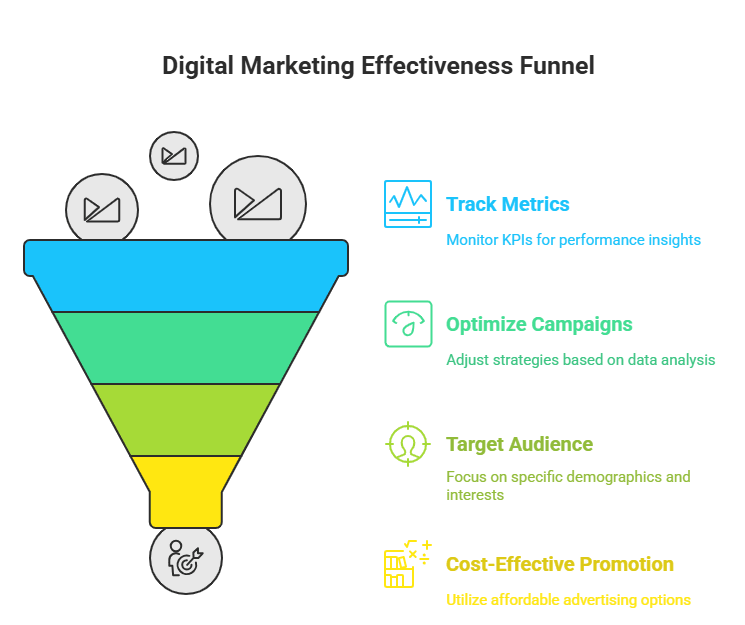
Results Based on Metrics: Success is Quantified
Measuring the effectiveness of marketing strategies is difficult with other forms of marketing, like television or print ads. With digital marketing, measuring success becomes much easier. Everything is at hand and every metric can be tracked to see how best to optimize campaigns and improve outcomes.Consider a scenario where you run a Facebook advertisement campaign. For measuring Return of Investment (ROI), views, ad clicks, and purchases can be monitored. In cases where ad performance falls below expectations, adjustments can be made to the ads. In digital marketing, having insights makes command and control much easier. This is the reason digital marketing works in all of its forms.
Scenario:
An online small scale clothing store targets ads towards people interested in fashion through Instagram. In addition to clicks and purchases, the store gains information regarding the color and size of the purchased items on Instagram, which can be used to optimize future campaigns and increase sales afterward. So does digital marketing drive ROI? Absolutely!
Unmatched and Low-Cost Promotion
The variety of potential customers available is yet another reason why online marketing can be considered 100% legit. Whether you’re operating from a small town or a metropolitan area, the floating population is in millions.
Unlike in the past where only big businesses could afford to run mass media campaigns, now small businesses can compete with larger companies using Facebook, Instagram, and Google Ads. These platforms allow businesses to run cheap ads that capture the highest chances of conversion.
Example:
A local café has started using Instagram stories to advertise discounts available over the weekends. The ad is seen by hundreds of locals, with some actually coming in to use the offer. This happens because the ad spend is very low.
Almost Too Good To Be True Targeting
The objective of digital marketing goes beyond simply expanding the visibility of your business; it involves reaching the right people.
With modern marketing feature refinement, you can decide who gets to see your ads based on where they live, what hobbies they have, how they spend time online, and even their shopping history. This way, you can stop wasting advertising dollars on people who will never become potential customers.
Example:
A technology startup that sells smart home devices targets ads to users who previously expressed interest in smart devices on Google and Facebook. Ads are only shown to users who are likely to purchase smart home devices. As a result, the company does not spend money on unnecessary clicks or views.
Common Misconceptions of Digital Marketing
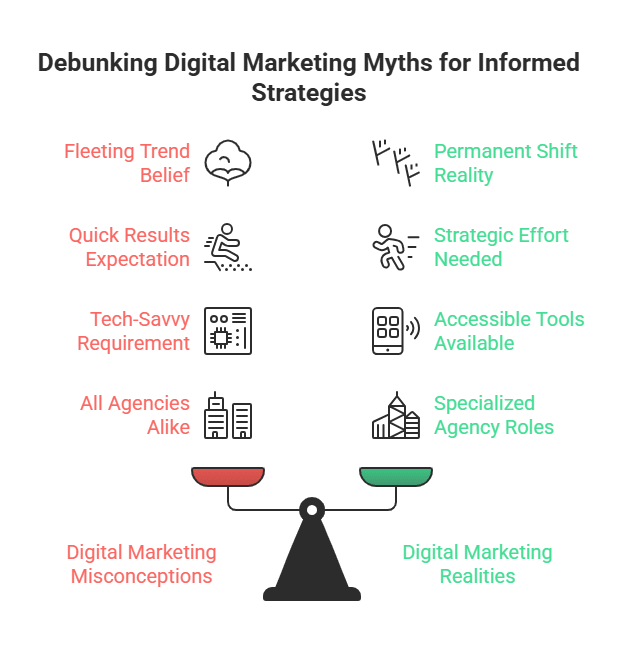
Despite the digital marketing’s effectiveness for a business, certain misconceptions tend to linger. Allow us to debunk them once and for all!
“Digital Marketing Is Just a Trend”
There are those who believe that digital marketing will be replaced by traditional marketing methods. This could not be further from the truth. With more than 4.6 billion people around the globe connected online, increasing spending on digital ads, and growing adoption of marketing technology solutions, digital marketing is legitimate and here to stay. In fact, the shift to digital is permanent, and businesses that fail to adapt will find themselves obsolete.
Example:
Look at Amazon and Netflix. They didn’t ride a wave; they created entire industries using digital marketing. These companies transformed industries because they leveraged the permanently accessible digital channels.
“Digital Marketing Guarantees Quick Results”
It’s important to note that the outcomes of a digital marketing strategy won’t yield instant success. Many individuals are drawn to “get-rich-quick” schemes, and digital marketing is no different. With digital marketing, a clearly defined strategy and sustained effort over time is critical. In the case of SEO, results must first go through rigorous search engine scrutiny before being made visible, and accumulating a loyal following on social media requires consistent content over several months and audience engagement for years.
Example:
Consider the example of a startup that invested in SEO for their blog. Through months of crafting optimized content, the company started ranking on Google, leading to a surge in organic traffic. The results they achieved certainly looked impressive but, in fact, this was the result of a meticulous long-term strategy.
“You Need to Be Tech-Savvy to Succeed”
This is an absolute myth as you don’t need to be a tech wizard to thrive in digital marketing. While understanding some of the basics helps, not being a coding expert or a digital marketing professional won’t get you booted out of the field. User-friendly platforms such as WordPress, Mailchimp, and Facebook Ads are equipped with easy-to-navigate interfaces, and countless tutorials and resources exist to aid beginners in starting their digital marketing journey.
“Every Digital Marketing Agency Is Alike”
Similar to other industries, there will always be agencies who promise that you’ll become a millionaire in no time, only to scam you years later. While this is frustrating, it doesn’t mean there is a lack of reputable agencies. There are many that have earned and still actively maintain a good industry reputation. In order to find an agency that will help you increase your revenue, be sure to check their research, reviews, and available case studies.
How Digital Marketing Grows Businesses
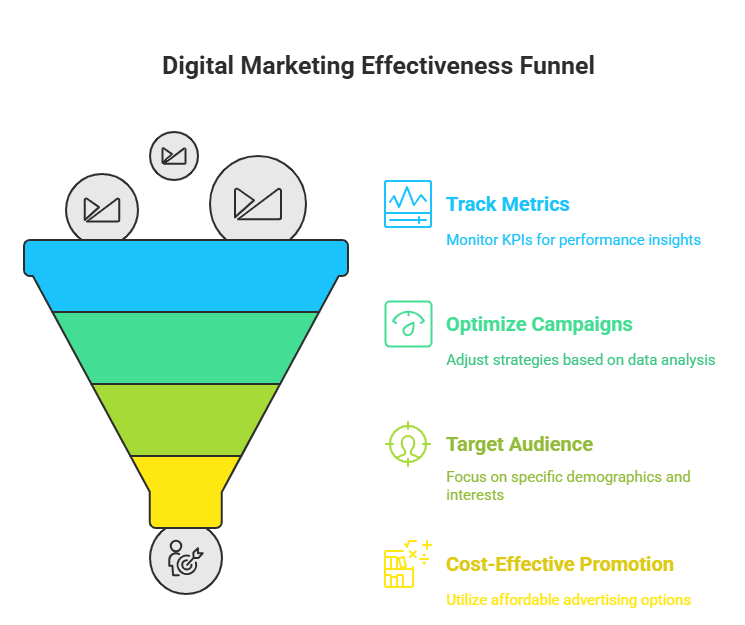
Now that we’ve worked to dispel some myths, let’s take a look at how digital marketing can foster real growth.
Developing Brand Recognition
The very first part of any marketing endeavor is introducing your brand to potential consumers. Digital marketing offers one of the quickest ways to create brand awareness via social media or paid advertising.
Example:
A recently launched gym uses Google Ads as well as local SEO techniques to target searches for “gyms near me” within a certain radius. This offers a high probability of them gaining new members.
Fosters Customer Engagement
In contemporary business, engagement helps increase enduring loyalty. Through digital marketing, companies can connect with their customers during interactions, respond to inquiries, and offer tailored experiences in real time.
Example
A beauty brand engages with its audience by holding live Q&A sessions through Instagram Stories, answering product questions and requesting feedback. This kind of engagement strengthens customer trust and brand loyalty.
Offers Quanitifiable ROI
Digital marketing as the rest of the marketing campaigns, fosters tracking of spending against the return on investment (ROI) as they go hand in hand. Every strategy used in marketing will yield measurable outcomes whether it be advertising, social media over emails, or vise versa.
Example:
An SaaS business monitors conversion rates from email marketing campaigns to paid subscriptions. These figures enable the business to adjust strategies and optimize conversions.
Conclusion: Is digital marketing legit?
Therefore, is digital marketing legit? The answer is no. With a proper plan and strategy, gradual implementation, and patience, digital marketing will become one of the best decisions for your business.
Companies can engage customers, drive brand awareness, capture new audiences, and do all this at a low cost with the right approaches. There’s no question that digital marketing will still be a vital component for business growth in 2025 and years to come. This is especially true with the continued evolution of technology.
